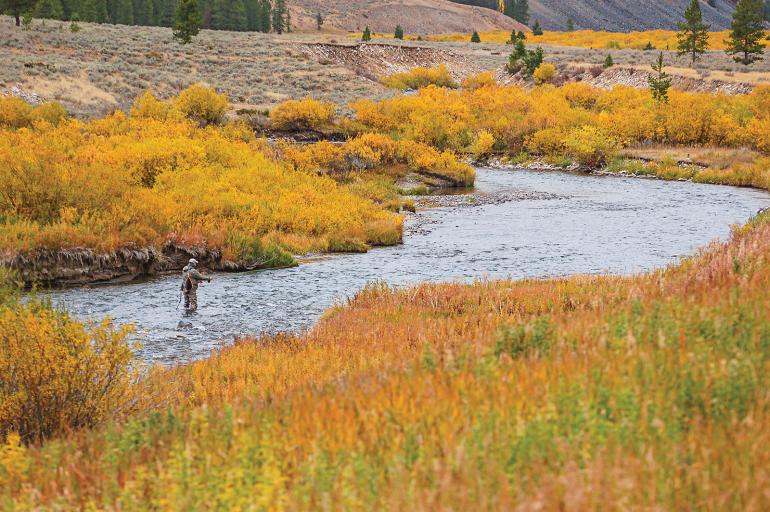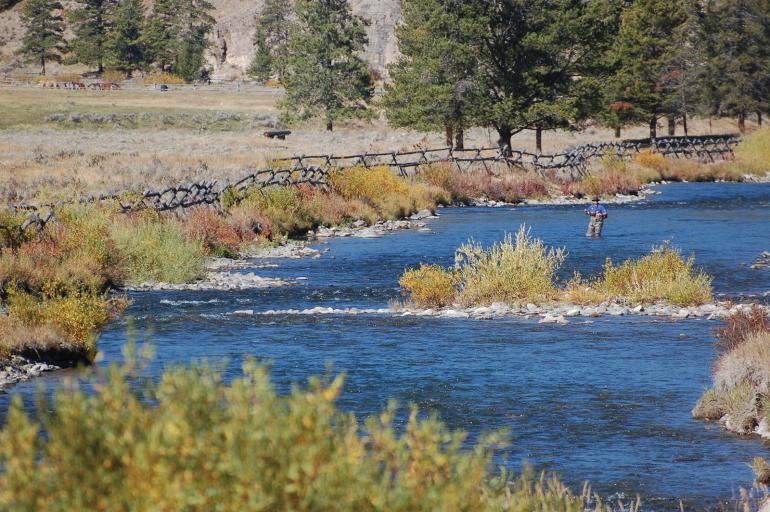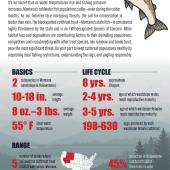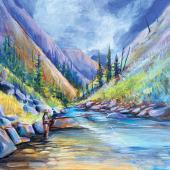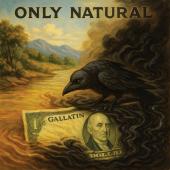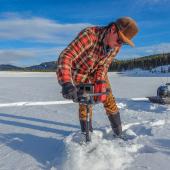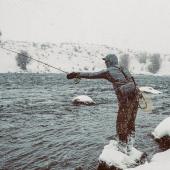The Heretic
Revisiting the Gallatin, 40 years later.
The summer that Mike and I flew out to Montana to be trout bums for a week, I told him about a pool on the Gallatin River, about midway between Big Sky and West Yellowstone, that I wanted to hit. It lay somewhere near a well-known dude ranch called Elkhorn that had been founded by Ernest and Grace Miller in the 1920s—old friends of my mother’s family.
As a kid, I’d spent summers on the ranch, surely testing the patience of all the ranch hands. But every night after dinner, I’d hike to a particular stretch of water on the Gallatin. The pool I found there was filled with rainbow trout, whitefish, and the occasional brown; I caught lots of them on a $15 mail-order fiberglass fly rod. My goal, 38 years later, was to return to that same spot.
I’d spotted the hole I’d been dreaming of for all of those years as we drove along the highway from West Yellowstone, and suggested that we park our vehicle there and walk north to the next bridge.
Mike and I waded into the river together and made note of the fact that it sure didn’t feel much like September, in spite of the calendar. It was about nine o’clock, but the air temperature still hadn’t broken 50 degrees. There was a steady drizzle, so we put on our waders and rain gear to keep dry, clinging to the faint hope that it might feel a bit warmer, too. I’d spotted the hole I’d been dreaming of for all of those years as we drove along the highway from West Yellowstone, and suggested that we park our vehicle there and walk north to the next bridge. The plan was to work our way from there to the pool, scooping up as many fish as we could along the way.
We didn’t get a single strike.
By the time we reached the pool, the rain had stopped and it was warm enough to shed waders and jacket. I stepped bare-legged into the stream and made my first cast into the lower flat. I worked that piece of water with an array of terrestrials, attractor patterns, nymphs, and streamers, with no result. Mike went on ahead of me for a while and came back just as I was reeling in my line. He expressed his displeasure when I went back to the car, stowed my fly gear, and returned to the water with an ultralight spinning rod. Mike was all about fly fishing.
Having no shame of my own, though, I flipped a cast into the middle of the pool. Immediately, I hooked into a rainbow. I brought it in, revived it, then released it. Mike watched and shook his head. He was embarrassed by my behavior. A few casts later, a much larger trout smacked at my lure, but I struck back too late. I lost another fish just before noon, which was when we decided to take a break.
We met up with some aunts and uncles at the ranch’s dining hall for lunch. After we finished eating, the conversation turned to fishing. Uncle George was curious as to what Mike and I had seen on the river.
“How did you do?” he asked, leaning across the table so as to better hear my response.
“Okay,” I said.
“Yeah? What did you catch?”
“Not too much,” I replied. “But there was one nice rainbow.”
“What did you get it on?”
Now I’d done it. I knew full well that there was no way I was going to be able to adequately explain to George that his nephew had been chucking hardware into the sacred waters of the Gallatin River. Mike was attentive too, smiling as he wondered how I was going to get myself out of this. I tried to change the subject, but George would have none of it. I had piqued his interest by offering that I had successfully caught fish, and he wanted to know what I had learned. After all, he was heading out himself later on and he reasonably expected that I would share the wealth of my experience and clue him in.
I knew full well that there was no way I was going to be able to adequately explain to George that his nephew had been chucking hardware into the sacred waters of the Gallatin River.
Aunt Nancy was sitting next to her husband. In seeing my distress, she intervened. “George, he’s not going to tell you.”
George looked disappointed. “C’mon,” he coaxed.
“An eighth-of-an-ounce gold Phoebe spoon,” I whispered.
George glanced away to his left and looked as though he had suddenly smelled something unpleasant. But whatever disappointment he felt passed quickly and he turned back to me, smiling broadly.
“Time to head back to the cabin!” he announced. “There’s beer in the cooler for anyone who needs it!”
I pushed away from the table, grateful for the reprieve. We exited the dining hall and stood out in the bright sunshine. Nancy put her arm around my shoulders. I thought it was out of apology, for her husband grilling me over lunch, but instead she steered me over to an elderly gentleman who was sitting on a post near the entrance to the dining hall.
It was Dwight Minton, the guy who’d taught me pretty much everything I had learned about fly fishing for trout during that summer my family had first stayed at the ranch in 1969. While it’s true that my mother had actually instructed me in the basics of the double-haul cast before we made the trip to Montana, Dwight had taught me the subtle arts of reading water and selecting the right fly. I remember him trying to show me how to tie a nail knot one night at his cabin. The fact that we did so to the dim shine of an oil lantern probably had something to do with the relative failure of the effort, but his good humor more than smoothed over any frustration I might have felt.
Dwight and Brewster tramped a few dozen paces away from the bank and began driving the grasshoppers in front of them. The insects scattered in panic and many of them eventually hurled themselves into the water as they tried to escape.
I told Dwight about the poor results Mike and I had experienced that morning. I discreetly omitted any reference to my transgressions with the metal lure, though, figuring that I had offended enough people for one day. He told me that ever since the release of Robert Redford’s film, A River Runs Through It, the Gallatin had become overrun with what he termed “over-educated trout.” That will happen, Dwight said, given that every angler east of the Mississippi had arrived the summer following the film’s release, armed with a fly rod and determined to catch fish from the waters where the movie had been shot. He figured that those poor trout had seen just about every fly pattern in the famous book, Art Flick’s Streamside Guide to Naturals and Their Imitations.
By way of proving his point, Dwight recalled how he and his son Brewster had gone out fishing on one of their favorite sections of the river and had come across a run where several large trout were holding in the current. They noticed an abundance of grasshoppers along the shoreline and the two of them took turns casting an endless parade of hand-tied hopper imitations in hopes of getting a strike. But the fish showed no inclination to even acknowledge their efforts.
Finally, Dwight and Brewster tramped a few dozen paces away from the bank and began driving the grasshoppers in front of them. The insects scattered in panic and many of them eventually hurled themselves into the water as they tried to escape. Father and son stood and watched as the trout boiled on the water’s surface, gorging themselves on the bounty that the two men had provided.
I wouldn’t get back out to Montana for several more years after that visit with Mike. But when I finally did, I coaxed my wife out on the river one afternoon, just before dinner. Conditions were ideal and trout were rising all around us. I don’t recall us catching much of anything, though. I will blame that entirely on how much time we spent just taking in the whole scene—the river, the mountains, and the blue sky. It was a beautiful sight and we watched the fish slurped emerging flies just beneath the surface until it was time to go—all without casting a single metal spoon.
This essay is adapted from a story in The Flies Are Too Damn Small: Adventures of a Deeply Flawed Angler, and is reprinted with the permission of McFarland (McFarlandBooks.com).

